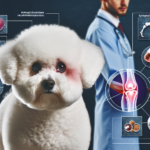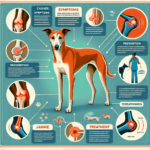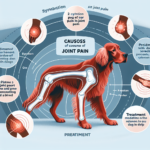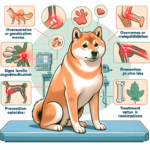Bichon Frise Joint Pain: Causes, Symptoms, Prevention, and Treatment

Introduction
The Bichon Frise is a small, cheerful dog breed known for its fluffy white coat and friendly disposition. Originating from the Mediterranean region, the Bichon Frise has a rich history that dates back to the 14th century. Initially popular among sailors and later becoming a favorite in European royal courts, this breed is now cherished as a loving companion dog. With their playful nature and hypoallergenic fur, Bichon Frises are a popular choice for families and individuals alike.
Despite their many endearing qualities, Bichon Frises are prone to certain health issues, including dental problems, allergies, and joint pain. Joint health is particularly crucial for this breed, as joint pain can significantly impact their quality of life. Understanding the causes, symptoms, prevention, and treatment of joint pain in Bichon Frises is essential for ensuring their well-being.
Breed-Specific Joint Pain Risks
Genetic Predisposition
Bichon Frises are genetically predisposed to several joint-related issues, including hip dysplasia, patellar luxation, and arthritis. Hip dysplasia occurs when the hip joint does not fit properly into the hip socket, leading to pain and mobility issues. Patellar luxation, another common condition, involves the dislocation of the kneecap, which can cause intermittent lameness and discomfort. Arthritis, a degenerative joint disease, can also affect Bichon Frises, particularly as they age.
Age-Related Risks
As Bichon Frises age, the risk of developing joint pain increases. Senior dogs are more susceptible to arthritis and other degenerative joint conditions. Typically, signs of joint pain may start to appear when the dog reaches middle age, around 7-8 years old. However, some dogs may show symptoms earlier, especially if they have a genetic predisposition to joint issues.
Activity Level and Joint Stress
Bichon Frises are known for their playful and energetic nature. While regular exercise is essential for their overall health, excessive or high-impact activities can put stress on their joints. Activities such as jumping from heights, running on hard surfaces, or engaging in strenuous play can exacerbate joint problems. It is crucial to balance their activity level to prevent undue stress on their joints.
Common Symptoms of Joint Pain in Bichon Frises
General Symptoms
Owners should be vigilant for common symptoms of joint pain in their Bichon Frise, including:
- Limping or favoring one leg
- Stiffness, especially after rest or sleep
- Reluctance to jump, climb stairs, or engage in physical activities
- Decreased activity level or lethargy
- Visible discomfort or pain when touched or moved
- Swelling around the joints
Breed-Specific Symptoms
In Bichon Frises, joint pain may manifest in specific ways, such as a noticeable “bunny hop” gait when running or a tendency to sit with one leg extended. These breed-specific symptoms can help owners identify joint issues early and seek appropriate treatment.
When to Consult a Vet
If you notice any of the above symptoms in your Bichon Frise, it is essential to consult a veterinarian promptly. Early diagnosis and intervention can prevent the progression of joint pain and improve your dog’s quality of life. Regular veterinary check-ups are also crucial for monitoring joint health and catching any issues early.
Preventive Measures for Joint Health
Exercise Recommendations
Maintaining an appropriate exercise routine is vital for the joint health of Bichon Frises. Low-impact activities such as walking, swimming, and gentle play are ideal for this breed. Avoid high-impact exercises like jumping or running on hard surfaces, as these can exacerbate joint stress. Aim for moderate, consistent exercise to keep your Bichon Frise fit and healthy without overburdening their joints.
Dietary Suggestions
A balanced diet rich in essential nutrients can support joint health in Bichon Frises. Consider incorporating foods or supplements that contain glucosamine, chondroitin, and omega-3 fatty acids, as these nutrients are known to promote joint health and reduce inflammation. Consult your veterinarian for specific dietary recommendations tailored to your dog’s needs.
Weight Management
Maintaining a healthy weight is crucial for reducing joint stress in Bichon Frises. Excess weight can exacerbate joint pain and lead to other health issues. Monitor your dog’s weight regularly and adjust their diet and exercise routine as needed to keep them at an optimal weight. Your veterinarian can provide guidance on appropriate weight management strategies for your Bichon Frise.
Early Screening and Monitoring
Early screening and regular monitoring can help detect joint issues before they become severe. Consider scheduling routine veterinary check-ups that include joint health assessments. Your veterinarian may recommend specific screening tests, such as X-rays or joint fluid analysis, to identify any underlying joint problems early on.
Treatment Options for Joint Pain
Non-Surgical Treatments
Several non-surgical treatment options can help manage joint pain in Bichon Frises:
- Medications: Nonsteroidal anti-inflammatory drugs (NSAIDs) and pain relievers can help reduce inflammation and alleviate pain.
- Physical Therapy: Therapeutic exercises and techniques can improve joint mobility and strengthen supporting muscles.
- Lifestyle Adjustments: Modifying your dog’s activity level and providing a comfortable living environment can help manage joint pain.
Surgical Options
In severe cases of joint pain, surgical intervention may be necessary. Common surgical options for Bichon Frises include:
- Hip Replacement: Replacing the damaged hip joint with an artificial one can significantly improve mobility and reduce pain.
- Arthroscopy: A minimally invasive procedure that allows the veterinarian to diagnose and treat joint issues.
- Patellar Luxation Surgery: Correcting the dislocation of the kneecap to restore normal joint function.
Surgical options should be considered after thorough consultation with a veterinarian and based on the severity of the joint condition.
Alternative Therapies
Alternative therapies can complement traditional treatments and provide additional relief for joint pain in Bichon Frises:
- Acupuncture: This ancient practice can help reduce pain and inflammation by stimulating specific points on the body.
- Hydrotherapy: Water-based exercises can improve joint mobility and reduce stress on the joints.
- Massage: Regular massages can help relax muscles, improve circulation, and alleviate joint pain.
Lifestyle and Management Tips
Daily Care Routine
A consistent daily care routine can help manage and alleviate joint pain in Bichon Frises:
- Provide regular, low-impact exercise to maintain joint mobility.
- Incorporate joint-friendly activities such as swimming or gentle play.
- Administer any prescribed medications or supplements as directed by your veterinarian.
- Monitor your dog’s weight and adjust their diet and exercise routine as needed.
Modifying the Home Environment
Making your home more comfortable for a dog suffering from joint pain can significantly improve their quality of life:
- Use ramps or stairs to help your dog access furniture or climb stairs without jumping.
- Provide orthopedic beds that offer extra support and cushioning for their joints.
- Ensure that your dog’s living area is free of slippery surfaces to prevent falls and injuries.
Long-Term Management
Long-term management strategies are essential for keeping your Bichon Frise active and happy despite joint pain:
- Maintain regular veterinary check-ups to monitor joint health and adjust treatment plans as needed.
- Continue providing joint-friendly exercises and activities to keep your dog engaged and mobile.
- Stay informed about new treatments and therapies that may benefit your dog’s joint health.
FAQs About Bichon Frise and Joint Pain
What are the early signs of joint pain in Bichon Frises?
Early signs of joint pain in Bichon Frises include limping, stiffness, reluctance to move, and visible discomfort when touched or moved. If you notice any of these symptoms, consult your veterinarian promptly.
Can joint pain in Bichon Frises be prevented?
While genetic predisposition cannot be entirely prevented, you can take several measures to reduce the risk of joint pain in Bichon Frises. These include maintaining a healthy weight, providing appropriate exercise, and ensuring a balanced diet rich in joint-supporting nutrients.
Are there specific exercises that are better for Bichon Frises with joint pain?
Low-impact exercises such as walking, swimming, and gentle play are ideal for Bichon Frises with joint pain. Avoid high-impact activities like jumping or running on hard surfaces to prevent further joint stress.
What dietary supplements can help support joint health in Bichon Frises?
Supplements containing glucosamine, chondroitin, and omega-3 fatty acids can support joint health in Bichon Frises. Consult your veterinarian for specific recommendations tailored to your dog’s needs.
When should I consider surgical options for my Bichon Frise’s joint pain?
Surgical options should be considered if non-surgical treatments are ineffective and your dog’s quality of life is significantly impacted by joint pain. Consult your veterinarian to discuss the best surgical options based on the severity of the joint condition.
Conclusion
Joint pain is a common concern for Bichon Frises, but with proper care and attention, it can be managed effectively. By understanding the causes, symptoms, prevention, and treatment options for joint pain, you can ensure your Bichon Frise enjoys a happy and active life. Regular veterinary check-ups, a balanced diet, appropriate exercise, and a comfortable living environment are essential for maintaining your dog’s joint health. Stay proactive in monitoring and addressing any joint issues to provide the best possible care for your beloved Bichon Frise.




